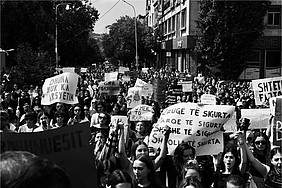This PhD project investigates from a transnational perspective contemporary feminist mobilization against gender-based violence in the post-Yugoslav space, which are
inscribed in a long tradition of feminist activism in this region. At the same time, they are also part of a worldwide rise in feminist resistance to gender-based violence in recent
years, encapsulated by movements such as #NiUnaMenos or #Metoo.
The concrete activities are taking place at a very local level, with concrete actions ranging from the organization of reading circles to larger protests, while resistance extends to
transnational spaces through social media presence. Consequently, this resistance embodies a form of both local and transnational feminist activism. Against this backdrop,
the primary objective is to investigate whether and how the various actors engaged in resistance against gender-based violence in the post-Yugoslav space develop a shared
transnational collective identity.
The research project is guided by a constructivist grounded theory method (Charmaz 2014) and uses a multi-site qualitative ethnographic research approach (e.g. Weissköppel
2005, Marcus 1995) to look at regional-transnational bottom-up feminist resistance. During the fieldwork, 60 semi-structured in-depth interviews and ethnographic
observations were conducted with members of the feminist movements in Belgrade (Serbia), Sarajevo (Bosnia and Herzegovina), Pristina (Kosovo) and Zagreb (Croatia).
Additional textual material was gathered through autoethnographic writings, fieldnotes, and collected textual sources, including excerpts from websites and social media posts.
The theoretical framework combines concepts of collective identities (e.g. Mackert 2021, Melucci 1995b, Talyor and Whitter 1992), transnational feminism (e.g. Cîrstocea 2019,
Tlostanova, Thapar-Björkert and Koobak 2019, Conway 2017) and feminist perspectives on violence (e.g. Vergès 2022, Butler 2020, Dorlin 2018). Moreover, it integrates insights
from feminist decolonial theory (e.g. Kulawik 2020, Kašić 2004) to expand the discussion on transnational feminism by including the often neglected Southeast European and postsocialist contexts.
In this way, this PhD project aims to provide insights for general theory-building on the process of transnational collective identity formation. It also seeks to contribute to a
broader research field at the intersection of gender and social movement studies, while enriching current debates on (transnational) feminist activism.
Laura Meier is a teaching assistant and PhD candidate in Sociology at the University of Fribourg at the Department of Social Work, Social Policy, and Global Development. She obtained her MA degree in Economics and Communication, with a specialization in Public Management and Policy (Università della Svizzera italiana), and a BA degree in Sociology and Media sciences (University of Basel). Her primary interests include feminist theory and methodologies, social movements, and grassroots mobilization, particularly feminist activism with a regional focus on Southeastern Europe. She is a member of the Gender and Political Science Research Network of the Swiss Association
for Gender Studies and a visiting fellow at the Graduate School Gender Studies of the Interdisciplinary Centre for Gender Studies (University of Bern). In her PhD project, Laura Meier examines current forms of feminist mobilization and resistance against gender-based violence in the post-Yugoslav space from a transnational perspective.

